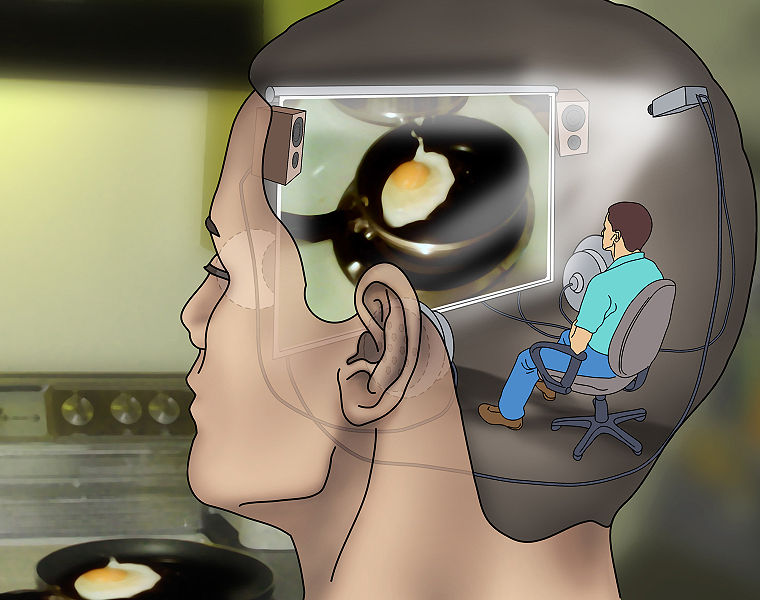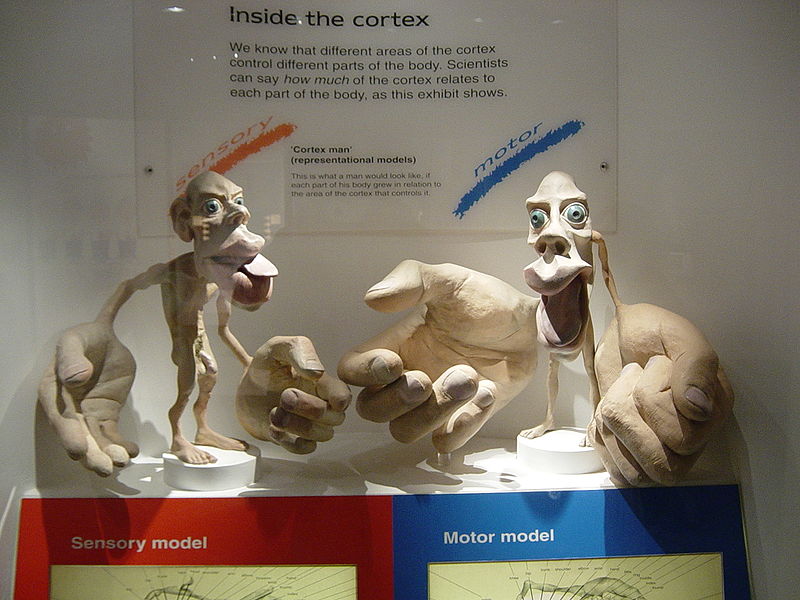A reader responds: Keith Nathan Brown

Frequent reader ‘keith n b’ offers a thoughtful response to a recent post quoting Proust, which induced the commentary “the explicitness of today is merely rendered before the eyes, not inside the mind.” When he encouraged me to elaborate, I asked him to do so, which he kindly did. I’ve culled the imperative/exceptional parts (My comments in brackets hereon):
Novelty and innovation, adapting to new information and technology is becoming a genetic disposition, inherited from our parents and ingrained from birth onward. As profound as the effects of electrical technology have been (e.g. the social and psychological consequences of the light bulb, the telephone, the television, etc.), the effects of digital technology stand to surpass those, veritably rewiring our mental hardware; and perhaps one small example of such an effect is the shift from primarily tactile experience to an overwhelmingly informational one.
The remark, “merely rendered before the eyes, not inside the mind,” seems to highlight (if one interprets “not inside the mind” as indicative of a fuller experience than one that is restrained solely to visual and surface perceptions) that the salient facts about life nowadays have very little to do with the full-spectrum, sensory-spatial awareness of our physical environment, and more so with the abstract data registered by the eyes and manipulated by fingertips on keyboards or pushing buttons. For many people their mode of work and entertainment occurs on screens, an LED-glow or vacuum-tube of visual input with isolated pockets of sound, in which all sense of spatial awareness has dissolved into private head-spaces of cubicles and remote controls, or non-spatial cyberspaces of faceless and cursor-blinking communication. Perhaps sight has always been our most important sense-asset, but it seems that our other senses are being deprived due to their obsoleteness in a techno-societal world whose laws of survival are dictated by abstract information as opposed to labor that requires movement of the body and exertion of the muscles. In the field of Neurology there’s a model called the cortical homunculus.

The body parts of the figures above are distorted to represent the corresponding number and sensitivity of the nerves, as well as how much space each part occupies in the sensory and motor cortex of the brain. If I were to visually depict a 2009 homunculus, I would further enlarge the eyes and shrink all of the other exaggerated features except for its very fingertips. Which prompts the question, Are we becoming our own stereotypical depictions of extraterrestrials: balloon-sized craniums with headlight eyeballs on top of shriveled limbs and appendages?
[I really like Keith’s idea of how we’re (subconsciously?) becoming alienlike, ‘schematically’ for now at least — though if we apply evolutionary time frames, we just may be currently evolving into such creatures. It’s like you can’t watch a fingernail grow until it’s time to cut it. Also, the image reminds me of US red/blue state population ratio maps.]
Digital technology is converting us into abstract-information processing machines. Our eyes are little mouths with endless appetites, into which we shovel information-sustenance with the fury and fervor of workers shoveling coal into the fiery furnace of a locomotive whose conductor is snorting lines of cocaine off a blind hooker’s ass—
[The coal mining metaphor, intentional or not, follows up on Keith’s introduction (not included) which focused on post-industrial changes of human capacity (i.e. machine over body).]
 Where the hell are we going? Who’s driving this thing? Who am I and why do I wake up in the middle of the night with cold sweats and images of a half-dressed John Stamos clogging up my mind? Or more precisely, a lingerie-clad John Stamos reading from Dreyfus and Spinosa’s essay “Further Reflections on Heidegger, Technology, and the Everyday,” in which so-and-so is quoted in her assertion that contemporary culture is a shapeshifter culture, thus supporting Heidegger’s notion of the endless transformability of information, and which also gives rise to the possibility of interpreting even ourselves as a means to an end, which has become evident in the instant gratification mentality always saying get to the point, get to the point, always a means to an end and Proust’s description of a booger, if it continued any longer, would have bored me and I would be saying get to the point, get to the point, even though the description and the abiding contemplation of the booger itself is the point—exploring and playing with the tension generated by giving so much attention to something connotative of childhood bewitchery and low-class barbarity within a high-society setting, or to even delve beneath the surface of the booger into the phenomenological nature of the booger independent of its social taboo and thus exhibit the status of John Stamos as that which lurks in the dark forbidden folds of our collective unconscious much the same way that a booger lurks in the humid hollows of our hairy, finger-enchanting face-caves.
Where the hell are we going? Who’s driving this thing? Who am I and why do I wake up in the middle of the night with cold sweats and images of a half-dressed John Stamos clogging up my mind? Or more precisely, a lingerie-clad John Stamos reading from Dreyfus and Spinosa’s essay “Further Reflections on Heidegger, Technology, and the Everyday,” in which so-and-so is quoted in her assertion that contemporary culture is a shapeshifter culture, thus supporting Heidegger’s notion of the endless transformability of information, and which also gives rise to the possibility of interpreting even ourselves as a means to an end, which has become evident in the instant gratification mentality always saying get to the point, get to the point, always a means to an end and Proust’s description of a booger, if it continued any longer, would have bored me and I would be saying get to the point, get to the point, even though the description and the abiding contemplation of the booger itself is the point—exploring and playing with the tension generated by giving so much attention to something connotative of childhood bewitchery and low-class barbarity within a high-society setting, or to even delve beneath the surface of the booger into the phenomenological nature of the booger independent of its social taboo and thus exhibit the status of John Stamos as that which lurks in the dark forbidden folds of our collective unconscious much the same way that a booger lurks in the humid hollows of our hairy, finger-enchanting face-caves.
[Again, nice allusion to coal mining (with ‘face-caves’) in relation to Proust’s booger picker. I get the sense that we’re digging into our own faces with swollen homunculus hands, a kind of non-thermal homeostasis, trying to dig away at something, like the brain inside. Thank you Keith for such interesting points, and the emphatic ending! As for John Stamos’ skull residency, you’re on your own.]
Tags: homunculus, Keith Nathan Brown, proust

Keith is an absolute favorite of mine. He is funny, wildly intelligent and has a massive heart. I have threatened him with driving up to his house in Mass to cook him potatos. I have a crush on Keith.
oh, and fantastic pic, jimmy.
thanks, the homunculus one is keith’s.
thanks, the homunculus one is keith’s.
You should read his Netsub essay coming out in Puetro Del Sol! It’s a fantastic critical look at the type of literature that’s popular in these here parts. It’s helped lend a bit of understanding to me about texts that previously left me flabbergasted.
You should read his Netsub essay coming out in Puetro Del Sol! It’s a fantastic critical look at the type of literature that’s popular in these here parts. It’s helped lend a bit of understanding to me about texts that previously left me flabbergasted.
[…] onward. As profound as the effects of electrical technology have been (e.g See more here: <HTMLGIANT> > Blog Archive » A reader responds: Keith Nathan Brown Commonactual-physical, human-capacity, industrial technology, instructors, light, not-included, […]
pr: your threats do not scare me, whether they are driving up here to cook me potatoes, or ‘crushing’ me (hopefully beneath you). bring it on.
brad: aside from my mother, you’re my biggest fan.
jimmy: i don’t know what ‘non-thermal homeostasis’ means, but if it’s a come-on, i’m open to persuasion.
pr: your threats do not scare me, whether they are driving up here to cook me potatoes, or ‘crushing’ me (hopefully beneath you). bring it on.
brad: aside from my mother, you’re my biggest fan.
jimmy: i don’t know what ‘non-thermal homeostasis’ means, but if it’s a come-on, i’m open to persuasion.
pr: your threats do not scare me, whether they are driving up here to cook me potatoes, or ‘crushing’ me (hopefully beneath you). bring it on.
brad: aside from my mother, you’re my biggest fan.
jimmy: i don’t know what ‘non-thermal homeostasis’ means, but if it’s a come-on, i’m open to persuasion.
Interesting thoughts. I enjoyed thinking about this, Keith.
Interesting thoughts. I enjoyed thinking about this, Keith.
Interesting thoughts. I enjoyed thinking about this, Keith.
thanks ken. enjoying your ‘influences’ and ‘booklyfe’ series.
thanks ken. enjoying your ‘influences’ and ‘booklyfe’ series.
thanks ken. enjoying your ‘influences’ and ‘booklyfe’ series.